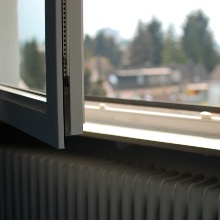Specific tips for everyday life
How to ventilate a room correctly
Proper ventilation and heating in the workplace helps improve indoor air, prevent mold growth and maintain a healthy indoor environment. Perform shock ventilation several times a day by opening the windows wide. Shock ventilation is much more effective compared to ventilation by window tilting, as more air is exchanged in a shorter time.
In summer, use the cool morning air to ventilate the rooms. If possible, open several windows at the same time for about 20-30 minutes, preferably cross-ventilation. Before ventilating the room, open cupboard doors so that the heat stored there can escape.
As soon it is warmer outside than inside, or when the sun shines directly on the windows, the windows should be closed because otherwise only warm air flows into the room, which can further heat up the space. This means, from about 25°C outside temperature close the windows (do not tilt them) and only open again, when it is cooler outside than inside.
If possible, lower the blinds as soon as the sun shines on your windows.
Keep the windows closed at night. Otherwise, during rain or thunderstorms, there is a risk of moisture entering the room, which can cause significant damage to the building. You are responsible for your windows! The university administration cannot close your windows.
If you suffer from hay fever or pollen allergies, airing should be done in the morning, if possible, because in cities the concentration of pollen in the air is lower in the morning. Less pollen enters rooms when ventilating with short blasts of air than when leaving the windows tilted for long periods.
In winter, ventilate rooms several times a day for about 5 minutes. Turn down the heating when ventilating the room. Lower exterior blinds at night. This helps to retain the heat in the room.
Turn off computer monitors
We can improve energy efficiency at the PC workstations by optimizing computer monitor power settings, for example by using the system settings to ensure that the monitor switches off automatically. To do this, you can set the required time period in the settings by clicking on the "Energieoptionen" (Power options) menu, followed by the "Bildschirm ausschalten" (Turn off monitor) submenu, which ensures that the monitor is automatically turned off when not in use. This only applies to the monitor, not the PC. When you move the mouse, the monitor is activated again. If we assume that every monitor is turned off for one hour per workday, consuming only 3 watts instead of 40 watts, and we also assume that the power settings have not been optimized on half of the PC workstations, we would save about 22 MWh per year. This corresponds to an annual electricity consumption of about four or five single-family homes. And in general, computers and monitors should always be turned off at the end of the working day.
Don't put office furniture in front of the radiators
If office desks or shelves are placed directly in front of radiators, heat builds up in these areas and the thermostat cannot regulate the temperature correctly. This requires up to 24 percent more heating energy. If we assume that this is the case in around ten percent of offices, we could save around 120 MWh of heat per year. This corresponds to the annual energy consumption of around six single-family homes.
Defrost refrigerators
Do you use refrigerators at your institute or facility? Regularly defrosting a refrigerator will reduce electricity usage by up to 30 percent of electricity. Assuming there are 300 refrigerators at the university, regular defrosting would save us about 16 MWh a year. That's about as much as three single-family homes consume in electricity per year. And do all the refrigerators even need to be turned on?
Save energy. Together!
These examples show that even small, individual changes to behavior can make a big difference.
The state government's goal is to save 20 percent of energy. At the University of Stuttgart, we would like to contribute by saving energy together. The University of Stuttgart's average heat consumption over the past few years was around 74,000 megawatt hours (MWh), while average electricity consumption was 90,000 MWh. To achieve our savings target, we need to save around 14,800 MWh of heat and 18,000 MWh of electricity. This corresponds to the annual heat consumption of 740 single-family homes and the electricity consumption of 3,600 single-family homes. Together, we can reduce energy use by implementing small behavioral changes in everyday life at the university.


